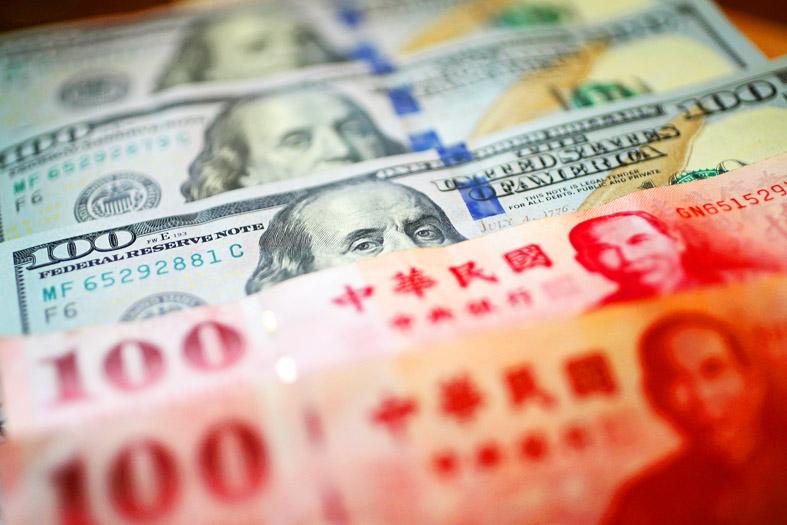Taiwan’s foreign-exchange reserves hit a record at the end of last month, helped by higher returns on its reserve portfolio and a weaker US dollar that made its non-US dollar assets more valuable.
The reserves increased for the third consecutive month to US$546.70 billion, up US$1.802 billion from September, the central bank said on Friday.
That meant Taiwan had the fifth-largest foreign-exchange reserves in the world after China (US$3.2 trillion), Japan (US$1.28 trillion), Switzerland (US$1.004 trillion) and India (US$577.1 billion).

Photo: CNA
Department of Foreign Exchange Director-General Eugene Tsai (蔡炯民) said that the weakness of the US dollar index, which tracks the currencies of the US’ six major trading partners, drove the increase in Taiwan’s reserves.
The index fell 0.93 percent last month, the central bank said.
The Canadian dollar, British pound, Swiss franc, Chinese yuan and euro rose 3.12 percent, 2.52 percent, 2.37 percent, 1.33 percent and 0.62 percent respectively against the US dollar last month, while the yen fell 1.49 percent against the greenback.
Tsai said the US dollar is expected to become stronger as the US Federal Reserve considers raising interest rates starting in the middle of next year, after beginning to downsize its asset purchases this month.
Meanwhile, the value of foreign investor holdings in Taiwanese stocks, bonds and New Taiwan dollar-denominated deposits totaled US$698.7 billion, up from US$691.3 billion in September, the central bank said.
Those holdings represented 128 percent of Taiwan’s total foreign exchange reserves, up 1 percentage point from the previous month, the bank added.
Tsai said that the amount of holdings by foreign investors were largely unchanged as Taiwan’s stock market rose 0.31 percent last month.
Foreign institutional investors were net sellers of NT$186 million of shares during the month, but when including cash dividends they remitted out of Taiwan, the net sell increased to NT$5.43 billion, the central bank said.

South Korea’s equity benchmark yesterday crossed a new milestone just a month after surpassing the once-unthinkable 5,000 mark as surging global memory demand powers the country’s biggest chipmakers. The KOSPI advanced as much as 2.6 percent to a record 6,123, with Samsung Electronics Co and SK Hynix Inc each gaining more than 2 percent. With the benchmark now up 45 percent this year, South Korea’s stock market capitalization has also moved past France’s, following last month’s overtaking of Germany’s. Long overlooked by foreign funds, despite being undervalued, South Korean stocks have now emerged as clear winners in the global market. The so-called “artificial intelligence

‘SEISMIC SHIFT’: The researcher forecast there would be about 1.1 billion mobile shipments this year, down from 1.26 billion the prior year and erasing years of gains The global smartphone market is expected to contract 12.9 percent this year due to the unprecedented memorychip shortage, marking “a crisis like no other,” researcher International Data Corp (IDC) said. The new forecast, a dramatic revision down from earlier estimates, gives the latest accounting of the ongoing memory crunch that is affecting every corner of the electronics industry. The demand for advanced memory to power artificial intelligence (AI) tasks has drained global supply until well into next year and jeopardizes the business model of many smartphone makers. IDC forecast about 1.1 billion mobile shipments this year, down from 1.26 billion the prior

People stand in a Pokemon store in Tokyo on Thursday. One of the world highest-grossing franchises is celebrated its 30th anniversary yesterday.

Chinese artificial intelligence (AI) start-up DeepSeek’s (深度求索) latest AI model, set to be released as soon as next week, was trained on Nvidia Corp’s most advanced AI chip, the Blackwell, a senior official of US President Donald Trump’s administration said on Monday, in what could represent a violation of US export controls. The US believes DeepSeek will remove the technical indicators that might reveal its use of American AI chips, the official said, adding that the Blackwells are likely clustered at its data center in Inner Mongolia, an autonomous region of China. The person declined to say how the US government received